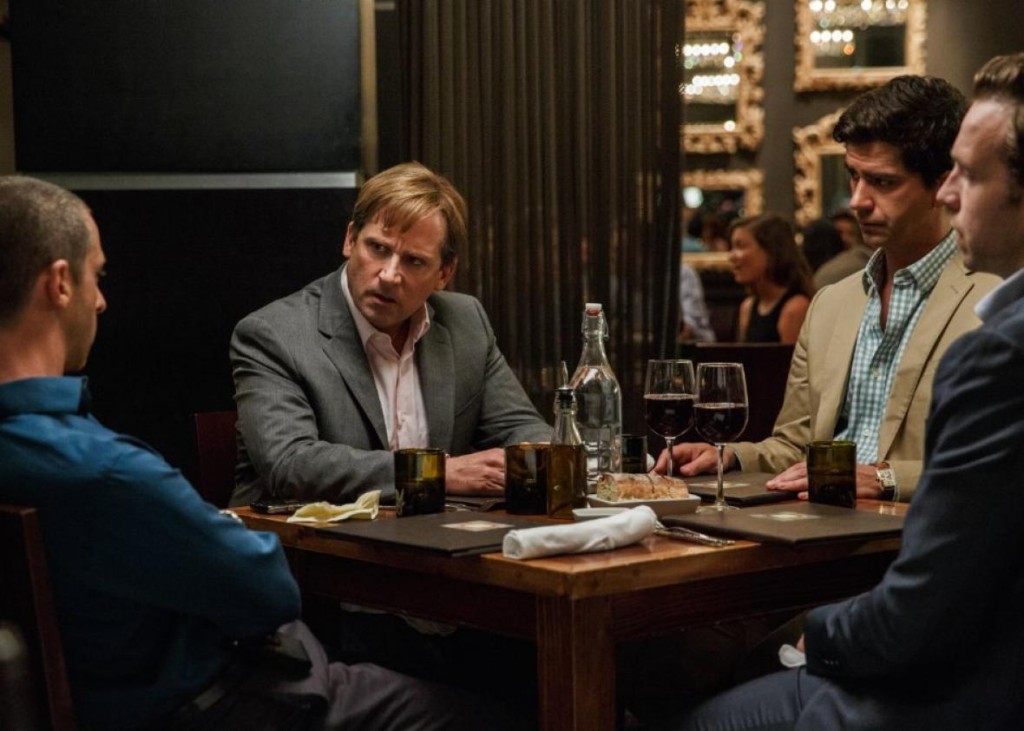In most years, the Oscar slate is a mishmash of topics, themes, settings, and styles. That will be true this year, too, but there’s an interesting number of rhyming pairs among the 2015 contenders. Each film in these pairs competes against its twin for ticket sales, awards votes, and lasting affection. There are The Revenant & The Hateful Eight, both brutal and masculine Westerns. Then there’s the emotionally-wrenching female-led indies, Room & Brooklyn. Perhaps most surprisingly, Mad Max: Fury Road & The Martian, two blockbusters with equal praise from audiences and critics are making a run at the brass ring. There’s another pair that may have the best shot of all at the biggest prize come February: Spotlight & The Big Short. I’m not here to weigh in on their awards chances today, but their rivalry in the Oscar race feels relevant. These two films, which are both very good, have some striking similarities in theme and effect and strong contrasts in tone and style.
Both Spotlight and The Big Short are cinematic procedurals. They follow an ensemble cast as it discovers and unravels institutional ills that have infected two of of the most powerful forces in American life: the Catholic Church and Wall Street banks. Spotlight focuses on the investigative report team at the Boston Globe as it delves into the cover-up of Catholic priests’ sexual abuse of children in the Boston area. The Big Short follows three separate sets of hedge fund managers who discover the fatal weakness of American mortgages years before the 2008 meltdown. In both cases, the audience knows the endgame and neither film tries to introduce or pump up suspense about the protagonists’ eventual successes. We know that the Catholic Church systemically moved predatory priests between parishes and that defaults on sub-prime mortgages led to the worst financial crisis and economic slowdown since The Great Depression.
Instead, the respective filmmakers, Thomas McCarthy and Adam McKay, show us how these individuals discover the horrible truths hidden in plain sight. The big contrast comes in the style in which the filmmakers show this action. In Spotlight, the film follows the low-key template of All the President’s Men and shows us how the reporters dig up leads, coax information out in interviews, and chase down documents in an effort to comprehend and prove the vile crimes of the Archdiocese of Boston. It’s style is understated and entirely lacking in flash. McCarthy is content to let the construction of his screenplay and the skill of his actors carry all the tension and anger. There is no underlining for emphasis, which makes the few moments of revelation feel like a punch to the gut.
The Big Short has a bigger cast and a wilder style. McKay is most famous for the Anchorman farces and he brings that same manic energy to this film. It often works well, especially in the exhilarating breaks in the fourth wall and the addicting bombast of most performances. But the film fails to flesh out most of its characters and one of the major stars, Christian Bale, feels ultimately extraneous to the proceedings. It’s redeemed by a willingness to cut through the crap and expose the practices and tactics of Wall Street.
In both cases, the films hammer on a simple truism: the observation that individuals are generally good and will try to help each other out, but institutions, by their very nature, cannot and will not lend a helping hand. The Church saw protecting its clergy from punishment as more important than protecting innocents or seeing justice done. The Wall Street banks were so seduced by the profits of mortgage bonds and derivatives that it drove the entire economy off the cliff. People within both institutions knew that this was wrong and helped unravel the rotten system, but not before the damage was done. Each film ends with a postscript that spells out the scope and effects of the crimes committed by the Church and banks. I left both films filled with righteous anger. Call me an outrage junkie addicted to my own sense of righteousness (probably true), but these were still powerful and visceral reactions. I recommend both for that experience alone.







